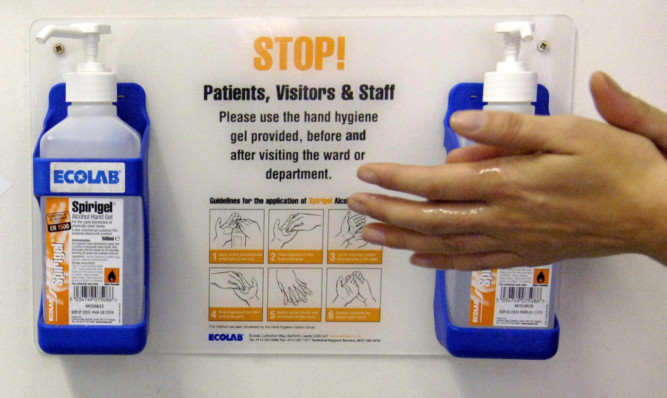NHS Tayside staff have some of the worst hand hygiene in the country, new figures have revealed.
Despite a series of campaigns to encourage hand washing in hospitals to reduce the spread of infectious diseases such as E coli and norovirus, an audit also revealed senior doctors are among those with the worst hand hygiene habits.
The study, aimed at reducing the spread of infection in Scotland’s hospitals, found that 12% of medical staff did not meet hand hygiene compliance standards in the two weeks leading up to February.
This is worse than other staff groups and below the overall average of 95%.
The figures also revealed that fewer doctors are washing their hands now compared to previous audits.
The Health Protections Scotland report shows nurses (96%), allied health professionals (9%) and other hospital staff (95%) all washed their hands more regularly.
But it showed “medical” staff which includes doctors, consultants and surgeons only had an 88% compliance rate.
There is also a wide variation among health boards regarding hand washing.
NHS Tayside had the third worst record in the country only 93% of staff washed their hands when they had the opportunity to do so.
Ninewells Hospital was hit with a series of ward closures this winter because of norovirus.
Only NHS Grampian (92%) and NHS Greater Glasgow (91%) had poorer hygiene standards.
NHS Fife had a compliance rate of 96%.
The Scottish Conservatives have urged the Scottish Government to step in and ensure the rates among medical staff, which have been consistently lower than other health workers, improves.
The party’s health spokesman Jackson Carlaw said: “These are the most senior figures in hospitals across the country and are supposed to be setting an example.
“Instead, they are the least likely to wash their hands, and that is increasing the risk of infection spreading.
“These statistics are now getting worse, and if it’s the case that senior medical staff simply feel they are above the rules, that attitude has to be weeded out.”
A spokeswoman said hand hygiene is a priority for the health board, adding: “NHS Tayside views hand hygiene compliance very seriously and all staff, including medical staff at senior and junior levels, have improved compliance in recent years.
“Monthly observations are undertaken by staff in clinical areas and spot checks are carried out by infection control staff.
“Any breaches are dealt with at the time and improvement plans are implemented in areas where performance is not satisfactory.
“All staff are encouraged to challenge themselves and others around improving hand hygiene compliance.
“The need for good hand hygiene practice is reinforced at every opportunity, for instance in teaching sessions and during routine visits and discussions.
“There is wide availability of antibacterial hand rubs at doors, beds and personal dispensers so staff have quick and easy access to these agents.”
Dr Neil Dewhurst, president of the Royal College of Physicians of Edinburgh, said: “It is essential that all members of clinical teams, including all levels of doctors, practise good hygiene, This will help to reduce the spread of infections.”
He said over-occupancy of hospital beds is to blame for transmission of norovirus.
